Introduction
The current situation of sustainability and global challenges is a topic that concerns both the end consumers and companies. The pressure for change in the environmental aspect comes not only from the European Union but also from the customers. Consumers are becoming aware of the impact of their purchasing choices and are actively addressing not only the quality and price of the products they purchase but also their origin, composition, or side effects. Companies are therefore forced to centrally and locally change their activities.
Partial objectives of this article include:
(1) analysis of the current state of the issue in Slovakia;
(2) identification of the attitude of companies towards this topic; as well as
(3) gathering the information about the available solutions. These pieces of information will be collected via market analysis within the food industry. The secondary data inputs obtained from the literature sources will actively support the theoretical foundations, and the environmental analysis will provide information on external influences. These data inputs will be compared with the research conducted in Slovak companies, focusing on the perception of sustainability as an aspect of business-making and its active implementation.
Theoretical background
Sustainability is already becoming a public matter. Therefore, this topic includes the description of sustainability in general, sustainability in relation to the food industry, and sustainability from the consumers’ perspective.
Sustainability and its form in the food industry
Sustainability can be viewed from several perspectives. When talking about the sustainability of a product, the focus is on whether the product is recyclable or produced in an environmental-friendly manner (Kim and Ko, 2012). Korten (2001) stated that the world has come closer to unity and people can find new social values for humanity. This opinion humanly describes the need for sustainability, not just within the business models but within an overall approach to the business-making. Consumption strongly depends on what is being offered. It is necessary to think whether the food that reaches consumers is sustainable and whether the companies producing it are building their business models responsibly (Ranta and Aarikka-Stenroos, 2008). However, this aspect also has a significant impact on consumers who are starting to look for values in the goods available.
According to Cambridge dictionary, sustainability is: “the idea that goods and services should be produced in ways that do not use resources that cannot be replaced and that do not damage the environment” (Demjanovičová, 2018). Strand (2006) then worked with the concept of CSR and sustainability. In addition to the CSR Implementation Adviser, he also conducted business ethics research. His work is a foundation for large companies that are trying to put CSR into practice. He focuses on the need for sustainability applications in mainstream companies. “The sustainability and networking of stakeholders are essential. One without the other is almost unreachable” (Strand, 2006). While companies are trying to follow the CSR practices and apply them to their daily activities, the overall outcome is influenced by the stakeholders who fail to comply with the agreed CSR parameters. This idea is also supported by the opinion of Ferenc, et al. (2017). Strand also points out that if the principles of sustainability are not entrenched in the whole structure of a company, they are ineffective (Strand, 2014).
Kucharčíková and Mičiak (2018) build on several definitions of sustainability in relation to sustainable development. Sustainability has a subset of activities that are specific to it. Hence, an organization may apply some of the values of sustainable development, but it still does not have to get to the state of a sustainable organization. Following this, the conditions that need to be met to achieve food sustainability are: “a sustainable increase in yields on the supply side and an improvement in the use of agricultural products at different stages, including a reduction in losses and wastage between the farm gate and the consumers plate” (Esnouf et al., 2013; Lendel, Varmus, 2013).
The food industry has an impact on the environment within the whole production chain, from growing through processing to distribution till the end of the products’ life span (Borghi et al., 2014). This statement is supported by Lafontaine et al. (2012) and Parent and Lavallée (2011). They emphasise that at the international level, an integrated evaluation of sustainability needs to stem from the life cycle of products.
Consumers’ behaviour
The customers’ behaviour is the feedback for the companies in relation to innovation but also to the plans for future growth. If a company knows the consumer preferences, it can effectively set its activities. It is essential to know the consumers and to understand their reactions and behaviours related to purchasing.
The entire business-making is focused on consumers. It is therefore important for companies to understand their consumers and meet their needs (Csengeri, 2020). In relation to the food industry, the aim of the quantification of the environmental properties of food and beverages also includes the communication of this information towards consumers. Via this process, the consumers become encouraged to make sustainable decisions (Jungbluth et al., 2000; De Melo Ferreira, E., De Vasconcelos Barros, R.T., Soviar, J., 2017).
The creation of a product or service that will meet the customers’ needs is not only connected to the product itself, price and promotion. Companies are also selling their values as a part of their products. The value is what is considered important. It is in the aspects to which an individual or a group attach importance. According to many authors (Hofstede, 1991; Kotter and Hesket, 1992; Hall, 1995), the values represent the core of the organizational culture (Lukášováet al., 2004). Consumers want to be a part of the product and therefore, they want to be a part of the company itself. To do this, they need to be able to identify with the company and its activities. The inner attitude of people is derived from what they focus on. Looking at an individual as a human being, the value can be defined as what s/he believes in. This perspective can be named psycho-social-behavioural (Blašková and Hriníková, 2019).
The current situation regarding sustainability and consumers’ behaviour
The identification of the current state within the studied topic was performed using relevant results describing the situation at the global, European and Slovak level.
Based on the global survey from 2012, over 56% of consumers are interested in environmental issues. In total, 17000 respondents were surveyed in relation to their consumer behaviour. The Sustainable Consumption Index – Greendex, and the guilt factor related to the environmental impact of individuals were developed. The guilt factor was the highest among consumers living in the countries where people behave the most sustainably. Regarding the extent to which consumers are able to contribute to the change and improvement of the environment, the results were the opposite (Pontis Foundation, online, 2013).
According to Cetelem’s European Consumer Behaviour Survey’s (2017) results, as many as 74% of Europeans are concerned about future environmental changes. This finding is supported by the importance of addressing sustainability. This was supported by further conclusions from the survey, where only 27% of the respondents were optimistic about the fate of future generations (only 21% in Slovakia). On the other hand, among the factors that would have a positive impact on the change in
a given country, the environmental management was at a low place in the ranking (only 15% of the respondents chose this factor), (Cetelem, online, 2017).
Thus, these results indicate the need for building environmental and sustainability awareness so that this factor is perceived by people as an important way of promoting the positive development of the country. The European Environment Agency was examining household consumption (2015). The results show that 13% of total European households’ expenditures were spent on food and non-alcoholic beverages. The impact on environment here includes travelling to shops, storage, cooking and waste generation (2016).
The situation in the Slovak market already reflects the need for responsibility for the environmental impact of business activities. Entrepreneurs realise that it is necessary to make changes in their activities. Venhartová (2019), director of the Food Chamber of Slovakia, presented the commitment to sharing best practices, fostering innovation in food production and packaging, and considering extraction of raw materials. ‘FoodDrink Europe’ has been devoting effort towards the sustainability of the food industry for a long time. It focuses on the objectives of the sustainable development included in the European Green Deal. The aim of the agreement is to create an environment in which sustainability can be implemented in the food industry (Jakubčo, 2019). “Our industry is still committed to achieving more sustainable food systems. Simply put, sustainability is the right thing for our businesses, for our society and for our planet” (Frewen, 2019).
The GfK is engaged in regular surveys of consumers’ behaviour in the Slovak Republic. A relevant finding is that in 2019, fresh and chilled foods accounted for up to 49% of the fast-moving consumer goods of Slovak households (GfK, 2019). Sustainability in the Slovak Republic is also addressed by the Sustainable Society Foundation (2016). In 2016, they published their own Index of Sustainable Society. The structure of this index consists of three main categories: (1) Welfare of humanity, (2) Quality of the environment, (3) Economic welfare. These categories are divided into several areas and each area includes various indicators.
The resulting evaluation of countries within the indicators and relevant areas ranged from 0 to 10. The Slovak Republic achieved the best evaluation of the following indicators: food, drinking water sufficiency, safe sanitation and renewable water resources (Sustainable Society Foundation, online 2016). In terms of food sustainability, the fifth-highest value attributed to the organic farming factor is an interesting result (Sustainable Society Foundation, online, 2016).
The presented findings show that the consumers are interested in environmental issues. They also feel guilty for behaviours that damage the environment. Especially, people in Slovakia are not optimistic about future changes in relation to the environment. A specific position in the achievement of the overall sustainability is held by the food industry. Here, the entrepreneurs’ statements indicate their focus on sustainability. Therefore, in this research, it is crucial to analyse the companies’ perception of sustainability and the activities already being performed to achieve it.
Research Methods
The materials for this article were selected from primary and secondary sources of data in the studied field. The primary focus is on food companies. Specifically, 13 companies from the Slovak Republic were approached by a deliberate selection (Sladkosti pre hostí, s.r.o., Art ateliér cafe, Aurelica coffee, Stanica Žilina-Záriečie, Miho cafe, Verticcio, Gentlejam s.r.o., Habesh coffee, LUZA SK, s.r.o., Československá pivotéka, VÁŽ SI, Le Torri, Extreme park s.r.o.). The primary data points were collected directly from companies’ owners, using the method of inquiring via a questionnaire survey. The aim of the survey was to identify the perception of sustainability by entrepreneurs. The aim included the perception of the importance of this issue linked to the business model and the actual implementation of the concept.
The part of the secondary research is aimed at large companies. Food stores operating in the Slovak Republic were selected. These are ones of the largest retailers in Slovakia, but at the same time, they are also well-known companies for performing positive activities in the field of sustainable development. These are the Tesco STORES SR, a.s., Lidl Slovak Republic, v.o.s., and METRO Cash & Carry SR s.r.o. (The abbreviations of the types of companies from Slovak language are explained as follows: a.s. = SpA; v.o.s. = C.I.; s.r.o. = Ltd.).
The methods used in the research that are presented in this article included the analysis, synthesis, comparison and statistical analysis (frequencies and techniques of exploratory analysis). The method of case studies was applied in two ways: analysis of existing cases, and creation of an original case. According to Yin (2017), the application of the case study method has six elements: “the plan, design, preparation, data collection, analysis and reporting”. A case study is defined as “an empirical inquiry that investigates a contemporary phenomenon in depth and within its real-world context”. This method helps explain the outcomes because the analysis consists of matching empirically observed events to the theoretically predicted ones.
Results
The research results combine the part represented by examined successful cases of companies operating in the food industry and their sustainable practices with the part of an original case study created, using answers in the questionnaire survey.
Analysis of selected cases from the food industry
Companies in Slovakia are already active in the social responsibility and in the sustainable development within the food industry. The solutions not only address waste management but also the sustainable development issues related to minimizing waste and preventing waste generation or reducing the carbon footprint. The survey discusses specific cases of companies in Slovakia as a successful application of a sustainable approach in the food industry.
Lidl
Lidl as one of the leading food suppliers in the Slovak market represents an ideal example of a socially responsible company. Since 2004, Lidl has been demonstrating a responsible approach not only to consumption but also to its own production. It eliminates the negative impact on the environment via its own eco-products and points to the need to perceive the environmental burden.
Table 1: Sustainable activities – Lidl
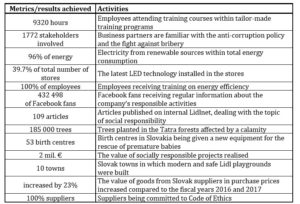
(Elaborated according to: Social responsibility, online, 2017)
“The one who stops improving, stops being good” this idea is stated in the report on sustainable operation of Lidl company in Slovakia (Social responsibility, 2017). The company has been in the Slovak market since 2004. At the beginning, it had 14 stores, now it has 141. The company is striving for continuous improvement in relation to suppliers’ networks, products or the stores themselves, including the level of work being done by the employees. Lidl has been awarded many times, getting awards such as Qudal – Top quality medal for the year 2016/2017. The company got the award related to quality in 2018/2019. It is a mark of the highest quality in the food industry in Slovakia. Besides, Lidl also got the award of the Retailer of the year in 2016 and 2017 and 2018. In addition, Lidl got the Best Buy award for 2019/2020 in the main category – the best ratio of price and quality.
Tesco
Tesco has been in the Slovak market since 1996. During this time, the company managed to create a network of 154 stores. Nowadays, the company belongs to one of the biggest private employers with more than 10,000 employees.
Table 2: Sustainable activities – Tesco
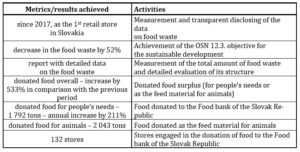
(Elaborated according to: SITA, Press agency, online 2019)
Tesco has received the Via Bona award in 2017 for the contribution to the fulfilment of sustainable development goals. It is one of the most prestigious awards in Slovakia. It is being given by the Pontis foundation as an acknowledgement for the most responsible companies in the Slovak market (teraz.sk, online 2018).
Original case based on a survey among CEOs of companies from the food industry
The findings obtained from the analysis of the secondary data sources were followed by the creation of an original case from the food industry in Slovakia. The creation was preceded by the design of
a questionnaire survey and its distribution to selected entities. These entities included companies from the Slovak Republic that are actively engaged in the food industry. The survey’s results are captured using tables and charts below.
The first question in the above-mentioned survey was focused on the identification of the perceived importance of individual elements of sustainability within the food industry. The results from the answers to this question are displayed in Fig. 1.
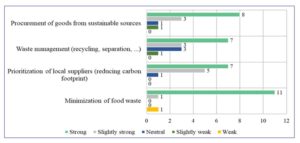
Fig. 1: The level of perceived importance of sustainability elements
Thus, the results show that the most important element of sustainability from the entrepreneurs’ perspective, based on the greatest number of the highest value assigned (strong), is the Minimization of food waste. Within the same context, it can be stated that the second place in the ranking is taken by the Procurement of goods from sustainable sources.
Subsequently, Tab. 3 was created, showing the total score of the perceived importance of the individual sustainability elements, beside the above-mentioned values (listed in Fig. 1). Based on this calculation, the order of importance was created for the sustainability elements.
Table 3: The order of the perceived importance of sustainability elements
according to the overall score

*Total score was calculated using the assigned value: 1=week, 2, 3, 4, 5=strong
This order indicates that the first place is still taken by the element of Minimization of food waste. However, the element of Procurement of goods from sustainable sources was shifted to the last place in the ranking. On the other hand, the identified differences are not considerable, so it can be stated that the listed elements of sustainability are comparably important for the entrepreneurs in the food industry in Slovakia.
The second question in the survey focused on the identification of the level at which the entrepreneurs are already actively engaged regarding the sustainability elements. The results are shown in Fig. 2. 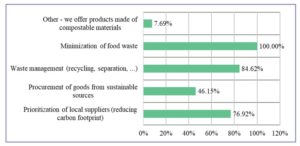
Fig. 2: Sustainability elements already applied in researched companies
In connection with Fig. 1 and Tab. 3, it can be concluded that entrepreneurs are really the most engaged in activities related to the element that they consider the most important.
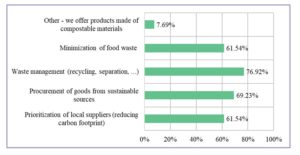
Fig. 3: Planned application of sustainability elements in selected companies
Then, Fig. 3 presents the results of the third question in the survey, revealing the planned changes in relation to sustainability.
The future focus of entrepreneurs in the food industry mostly leads to the element of Waste management (76.92% of the respondents) and the Procurement of goods from sustainable sources (69.23% of the respondents).
Discussion and Conclusions
The food industry belongs to the main producers of the food waste. The European Commission (EC) created a plan for “Europe efficiently utilising resources” that has been implemented since 2011. The EC estimates that 90 million tons of food are being wasted every year. The most serious aspect of these results is that the food that is becoming a part of waste is deteriorated and unsuitable for consuming. A huge part of this amount ends in the waste due to improperly set laws. According to the EC’s plan, the value chain of food and beverages accounts for 17% of direct emissions of greenhouse gasses. The EC’s plan appeals for the common effort of farmers, food industry, retailers and consumers via the manufacturing technology. The European goal is clear: decrease the disposal of edible food in the EU to one half by 2020 (eea.europa.eu, 2016).
Via the primary research, the outlook on the issue from the perspective of small entrepreneurs in Slovakia was perceived. The awareness of the need for the sustainable approach is high, regarding the fact that 100% of the addressed companies are minimizing the waste in their business-making and almost 77% of the respondents are planning to apply structured waste management into their business models. This idea is also supported by the opinion of Hittmár, et al., (2014). Other aspects that could be considered while modifying the business model include the impact on reputation, changes in the inventory management, utilisation of modern information systems, and ethical principles (Zraková et al., 2017; Sroka et al., 2015; Stopka et al., 2016; Kubina et al., 2015). In comparison with large companies studied, the awareness is at a very good level. Small companies realise the need for a sustainable approach to the business-making and they are planning to improve within this field. The approach of the studied large companies is an ideal example of responsible business models. Consumers appreciate these activities of companies, which is shown in the number of awards won by Lidl and Tesco. The results of this research are therefore aligned with Strand’s results. Specifically, they corroborate the importance of CSR activities and their linkage to consumers as a significant stakeholder group.
The main contribution of this article is represented by an in-depth analysis of food sustainability in the Slovak Republic based on a combination of primary and secondary sources within the real-world context. The contribution also lies in the implications for the business model’s changes.
Limitations and Implications for Future Research
Research limitations are due to the possible shortcomings of the case study method. These include: insufficient rigorousness, the application of the case study approach that would not be done in a scientific way, and the lack of quality of the study. The authors of this article tackled these limitations to the best of their abilities via following the scientific procedure described in the methodology part and using their academic skills and knowledge.
Implications for future research follow the fact that this qualitative research cannot be used for general statements valid for the whole set of Slovak companies. Therefore, future research can be focused on testing the results in a quantitative research so that the validity can be expanded to a representative sample. The next opportunity is in applying the business model with values identified in this article in other fields.
Acknowledgements
This paper was partially supported by the Slovak scientific grant KEGA 002EU-4/2019.
(adsbygoogle = window.adsbygoogle || []).push({});
References
- Blašková, M. and Hriníková, D. (2019). ‘Axiological management in higher education and values defined by students,’Aksiologiceskije aspecty v sovremennych naucnych issledovanijach. ISBN: 978-5-949-41224-4, Omsk, Russia: Omskij gosudarstvennyj universitet soobscenia, 2019, 5–14.
- (2017). ‘L’Observatoire Cetelem, Consumption in Europe: new paths to confidence,’Cetelem.[Online], [06-02-2020], Available: https://www.cetelem.sk/o-spolocnosti/aktuality/prieskum-spokojnosti-zakaznikov/Contents/0/observatoire_conso_2017_gb_ss_annexes_bd.pdf.
- Csengeri L. (2020). ‘Spotrebiteľský panel,’GfK,[Online], [05-02-2020], Available: https://www.gfk.com/sk/riesenia/spotrebitelsky-panel/.
- Del Borghi, A., Gallo, M., Strazza, C. and Del Borghi, M. (2014). ‘An evaluation of environmental sustainability in the food industry through Life Cycle Assessment: the case study of tomato products supply chain,’Journal of Cleaner Production 78, 121–130.
- Demjanovičová M. (2018). ‘Current situation in the field of management of the value of small and medium-sized enterprises through marketing activities,’London: Sciemcee Publishing. ISBN 978-0-9935191-7-8, 51–53. CER, 2018.
- De Melo Ferreira, E., De Vasconcelos Barros, R.T., Soviar, J. (2017) ‘Brazilian Waste Management: Belo Horizonte’s Case Study of Sustainable Management’ Slovakia: 12th International Scientific Conference Of Young Scientists On Sustainable. Modern and Safe Transport. TRANSCOM 2017; Volume 192, 171-176, 2017, Code 136438.
- europa.eu. (2016). ‘Potravinový odpad,’eea.europa.eu. [Online], [06-02-2020], Available: https://www.eea.europa.eu/sk/signaly-eea/signaly-2012/zaostrene-na/potravinovy-odpad.
- Esnouf, C., Russel, M. and Bricas, N. (2013). ‘Food System Sustainability: Insights from DuALIne,’ ISBN: 9781107036468. Cambridge University Press, 2013, 303.
- European Environment Agency. (2015). ‘Resource efficiency and waste – Consumption,’
europa.eu. [Online], [06-02-2020], Available: https://www.eea.europa.eu/soer-2015/europe/
consumption.
- European Environment Agency. (2016). ‘Efektívne využívanie zdrojov a likvidácia odpadu – Spotreba domácností,’europa.eu.[Online], [06-02-2020], Available: https://www.eea.europa.eu
/sk/themes/households/intro.
- P., Varmus. M. and Vodák. J. (2017). ‘Stakeholders in the various field and relations between them,’ 12th International Scientific Conference of Young Scientists on Sustainable, 31.05-02.06. 2017, 192, 166–170. DOI: https://doi.org/10.1016/j.proeng.2017.06.029.
- Frewen, M. (2019). ‘Potravinári chcú prispieť k ochrane životného prostredia,’sme
.sk,SITA,[Online], [05-02-2020], Available: https://ekonomika.sme.sk/c/22281402/potravinari-chcu-prispeit-k-ochrane-zivotneho-prostredia.html.
- (2019). ‘Consumer Reporter, 02/2019,’GfK.[Online], [06-02-2020], Available: https://www
.gfk.com/fileadmin/user_upload/country_one_pager/CZ/documents/2019/GfK_CR_2-2019_SK.pdf.
- Hittmár. Š., Varmus, M. and Lendel. V. (2014). ‘Proposal of model for effective implementation of innovation strategy to businness,’2nd World Conference on Business, Economics and Management (BEM): Antalya, Turkey. 08.01.2014, 109, 1194–1198. DOI: https://doi.org/10.1016
/j.sbspro.2013.12.611.
- Jakubčo, J. (2019). ‘Potravinári chcú prispieť k ochrane životného prostredia,’
sme.sk, SITA,[Online], [05-02-2020], Available: https://ekonomika.sme.sk/c/22281402/potravinari-chcu-prispeit-k-ochrane-zivotneho-prostredia.html.
- Jungbluth, N., Tietje, O. and Scholz, R.W. (2000). ‘Food purchases: impacts from the consumers’ point of view investigated with a modular LCA,’ J. Life Cycle. Assess. 5 (3), 134–142.
- Kim, A.J. and Ko, E. (2012). ‘Do social media marketing activities enhance customer equity?’An empirical study of luxury fashion brand, Bus. Res. 65 (10), 1480–1486.
- Korten and David C. (2001). ‘When Corporations Rule the World (2nd ed.),’ Berrett-Koehler Publishers, Inc., USA, ISBN 1-887208-04-6.
- Kubina, M., Koman, G. and Kubinova, I. (2015) ‘Possibility of Improving Efficiency within Business Intelligence Systems in Companies, ’Procedia Economics and Finance, 26, 300–305. DOI: https://doi.org/10.1016/S2212-5671(15)00856-4.
- Kucharčíková A. and Mičiak M. (2018). ‘Human Capital Management in Transport Enterprises with the Acceptance of Sustainable Development in the Slovak Republic,’ DOI: https://doi.org/10.3390/su10072530.
- Lafontaine, M., Saad, R., Gilbert, D. and Margni, M. (2012). ‘Environmental LCA of milk in Canada,’Proceedings of the 8th International Conference on Life Cycle Assessment in the Agri-Food Sector. 01.-04.10.2012, Saint Malo, France.
- Lendel, V., Varmus, M. (2013). ‘The level of utilization of innovative activities of transport bussinesses in the Slovak Republic’ Periodica Polytechnica: social and management sciences. 21, iss. 2, 83-90, ISSN 1416-3837.
- Parent, G. and Lavallée, S. (2011). ‘LCA Potentials and Limits Within a Sustainable Agrifood Statutory Framework,’ Global Food Insecurity, Springer, Netherlands, 161–171.
- Pontis Foundation (Nadácia Pontis). (2013). ‘Zodpovední spotrebitelia,’sk. [Online], [06-02-2020], Available: https://www.nadaciapontis.sk/novinky/zodpovedni-spotrebitelia/.
- Ranta V., L. Aarikka-Stenroos and S. J. Makinen (2018). ‘Creating value in the circular economy:
A structured multiple-case analysis of business models,’Journal of Cleaner Production, 201, 988–1000, [Online], [05-02-2020], Available:https://www.sciencedirect.com/science/article/pii/S095965
2618324089?via%3Dihub.
- Robert K. Yin. (2017). ‘Case study research design and methods,’SAGE Publications, 352. ISBN: 9781506336183.
- SITA, Press agency (Tlačová agentúra). (2019). ‘Tesco na Slovensku dosiahlo jeden z cieľov udržateľného rozvoja,’Tlačové správy. [Online], [06-02-2020], Available: https://tlacoves
sme.sk/c/22128800/tesco-na-slovensku-dosiahlo-jeden-z-cielov-udrzatelneho-rozvoja.html.
- Social responsibility (Spoločenská zodpovednosť). (2017). ‘Správa o trvalej udržateľnosti za rok 2017,’sk,[Online], [06-02-2020], Available: https://www.spolocenska
zodpovednost.sk/sites/default/files/csr-na-stiahnutie/lidl-csr-report-2017_sk.pdf.
- Sroka, W. and Lőrinczy, M. (2015). ‘The Perception of Ethics in Business: Analysis of Research Results,’ Procedia Economics and Finance, 34, 156–163. DOI: https://doi.org/10.1016/S2212-5671(15)01614-7.
- Stopka, O., Chovancová, M., Ližbetin, J., and Klapita, V. (2016). ‘Proposal for optimization of the inventory level using the appropriate method for its procurement,’ Nase More, 63 (3), 195–199. DOI: 10.17818/NM/2016/SI22.
- Strand R. (2006). ‘The Stakeholder Dashboard, Greener Management International,’ DOI: 10.9774/GLEAF.3062.2006.su.00005.
- Strand R. (2014). ‘Strategic Leadership of Corporate Sustainability,’Springer – Berlin, DOI: 10.1007/s10551-013-2017-3.
- Sustainable society foundation (Nadácia udržateľnej spoločnosti). (2016). ‘Index udržateľnej spoločnosti,’Enviro portál.[Online], [06-02-2020], Available: https://www.enviroportal.sk/pokrok-spolocnosti/index-udrzatelnej-spolocnosti.
- sk. (2018). ‘Tesco získalo ocenenie Via Bona 2017,’teraz.sk.[Online], [06-02-2020], Available: https://www.teraz.sk/slovensko/tesco-ziskalo-ocenenie-via-bona-2017/319168-clanok.html.
- Venhartová, J. (2019). ‘Potravinári chcú prispieť k ochrane životného prostredia,’SITA,[Online], [05-02-2020], Available: https://ekonomika.sme.sk/c/22281402/potravinari-chcu-prispeit-k-ochrane-zivotneho-prostredia.html.
- Zraková, D., Kubina, M. and Koman, G. (2017). ‘Influence of information-communication system to reputation management of a company,’ Procedia Engineering. ISSN 1877-7058, 192. 1000–1005. DOI: https://doi.org/10.1016/j.proeng.2017.06.172.








